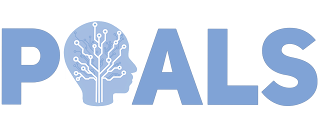Research
At RIKEN, I support researchers with their technical needs such as resolving software issues, planning for data management, and conducting my own research. When I was at Tokyo Tech after receiving my doctoral degree, I generally supported the research conducted by students in the research group I belong to. I also work on my own research program and jumpstart research collaborations. The overarching themes of my research are described below.
Human-AI Collaboration in Hybrid Systems
This research at RIKEN which is just getting started aims to investigate how collaboration materializes in systems where knowledge tasks are done with very capable machines. I'd make sure to give updates once we have any!
Personalized Online Adaptive Learning System (POALS)
POALS is a web-based system designed to help learners succeed in online learning environments. To succeed in online learning environments where instructor support might be less compared to face-to-face instruction, learners must be trained to be autonomous by equipping them with metacognitive skills. However, teaching metacognition inevitably introduces cognitive strain, which can vary among individuals. Thus, we introduce adaptive learning to personalize each learning experience. We tap into the teachers as learning facilitators by creating an analytics dashboard to give implicit feedback to teachers that they can use to provide interventions if necessary. This research is supported by the Japan Society for the Promotion of Science (JSPS) via Grant-in-Aid for Scientific Research (B) grant (Kakenhi 20H01719) from April 2020 to March 2025. This serves as the bulk of my doctoral dissertation and postdoctoral research.
 |
| POALS logo, designed by NinsWorks |
End-to-End Quality Assurance Process for MOOCs
The Online Education Development Office (OEDO) manages the online courses offered by the Tokyo Institute of Technology as massive open online courses (MOOCs) through the brand TokyoTechX and small private online courses (SPOCs) on the edX platform. To facilitate quality assurance and monitoring, OEDO developed web crawlers to download course contents and discussion board posts. OEDO envisions the end-to-end MOOC quality assurance to be conducted before, during, and after course release through various learning analytics approaches, including natural language processing.
Undergraduate Transdisciplinary Engineering International Program Evaluation
The Global Scientists and Engineers Program (GSEP) is Tokyo Tech’s purely English instruction-based undergraduate program in transdisciplinary science and engineering designed for international students with minimal to no Japanese communication ability. My role in this research is designing the evaluation protocol, conducting analysis, and writing up the results for a conference. The evaluation consisted of questionnaires, a mind mapping workshop, and a focus group discussion conducted with the program’s first cohort who graduated in March 2020. Aside from traditional statistical analysis, natural language processing was also used to understand the evaluation results. The first cohort showed satisfaction as graduates of the program, expressed confidence in their transdisciplinary knowledge, and saw themselves as global citizens. This evaluation is intended to be conducted on a regular basis.
Using Technology for Improving Research Potential of Cambodian Undergraduates
Developing highly skilled researchers is essential to accelerate the economic progress of developing countries such as Cambodia in Southeast Asia. Student's research capability growth starts with one's belief in their capacity to use the necessary information tools and their potential to succeed in research. We looked at how such beliefs, specifically research self-efficacy and information literacy, can be developed through a short-term intervention that uses MOOCs, and then assessed the training's long-term effects. We learned that short-term training intervention has immediate positive effects on undergraduate students' self-efficacies in Cambodian public provincial universities. However, while perfunctory interventions such as merely introducing the students to MOOCs and other relevant research tools over as little as three weeks can have significant positive effects, efforts must be made to sustain the benefits gained. My role in this research had been to assist with literature review, analysis, writing, and presenting results at conferences. This research was led by Dr. Cheyvuth Seng and was concluded in April 2021.
AI-assisted Writing Support for English as Second Language (ESL) Learners
In the past, ESL learners used tools such as spelling and grammar checkers to support their writing. With the development of computational natural language processing techniques, new tools such as next-word prediction are becoming more commonplace. The goal of this research is to investigate how these new technologies affect ESL learners and how these can be utilized to improve the ESL learning experience. My role in this research is to provide support in the development of the tool called AI Kaku (https://aikaku.app/), literature review, and data analysis. I also contributed to the research design where we tested some of the findings from the POALS Metacognitive Tutor in combination with the support provided by AI Kaku. This research is being led by John Maurice Gayed, then a doctoral student at the Cross Lab and now an assistant professor at Waseda University's Global Education Center. This is also supported by a Kakenhi, grant number 22K00718.
Comments
Post a Comment